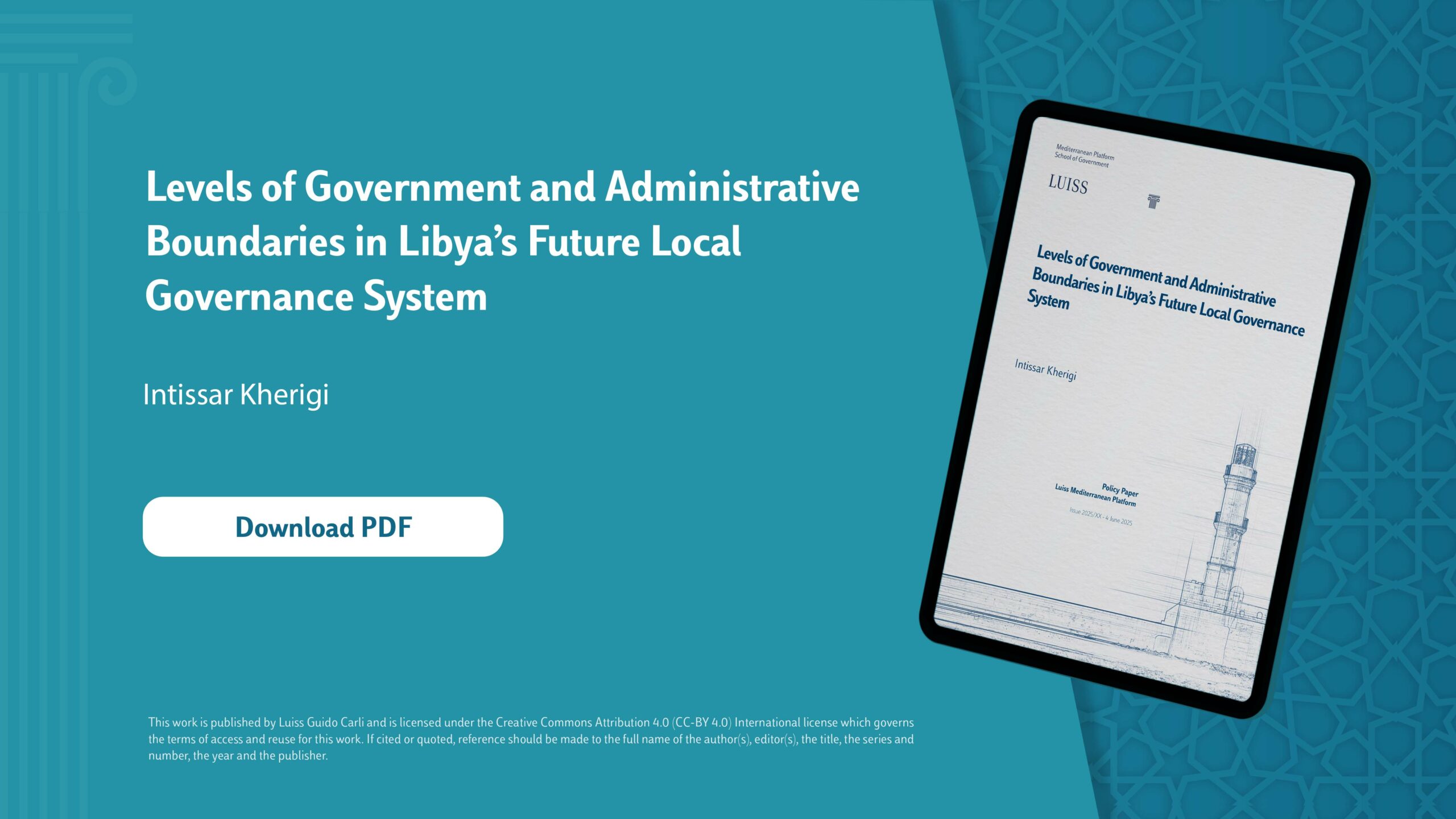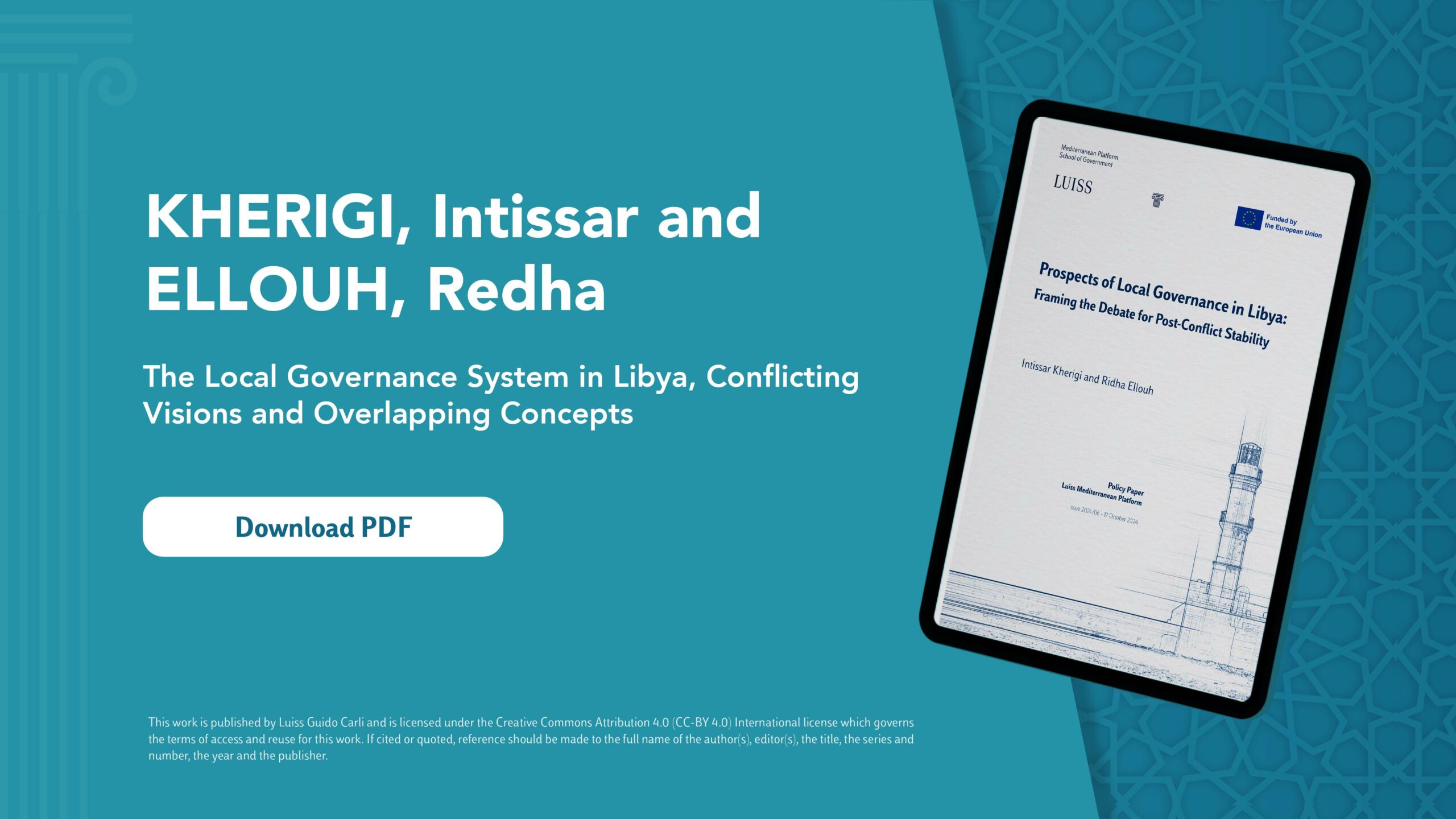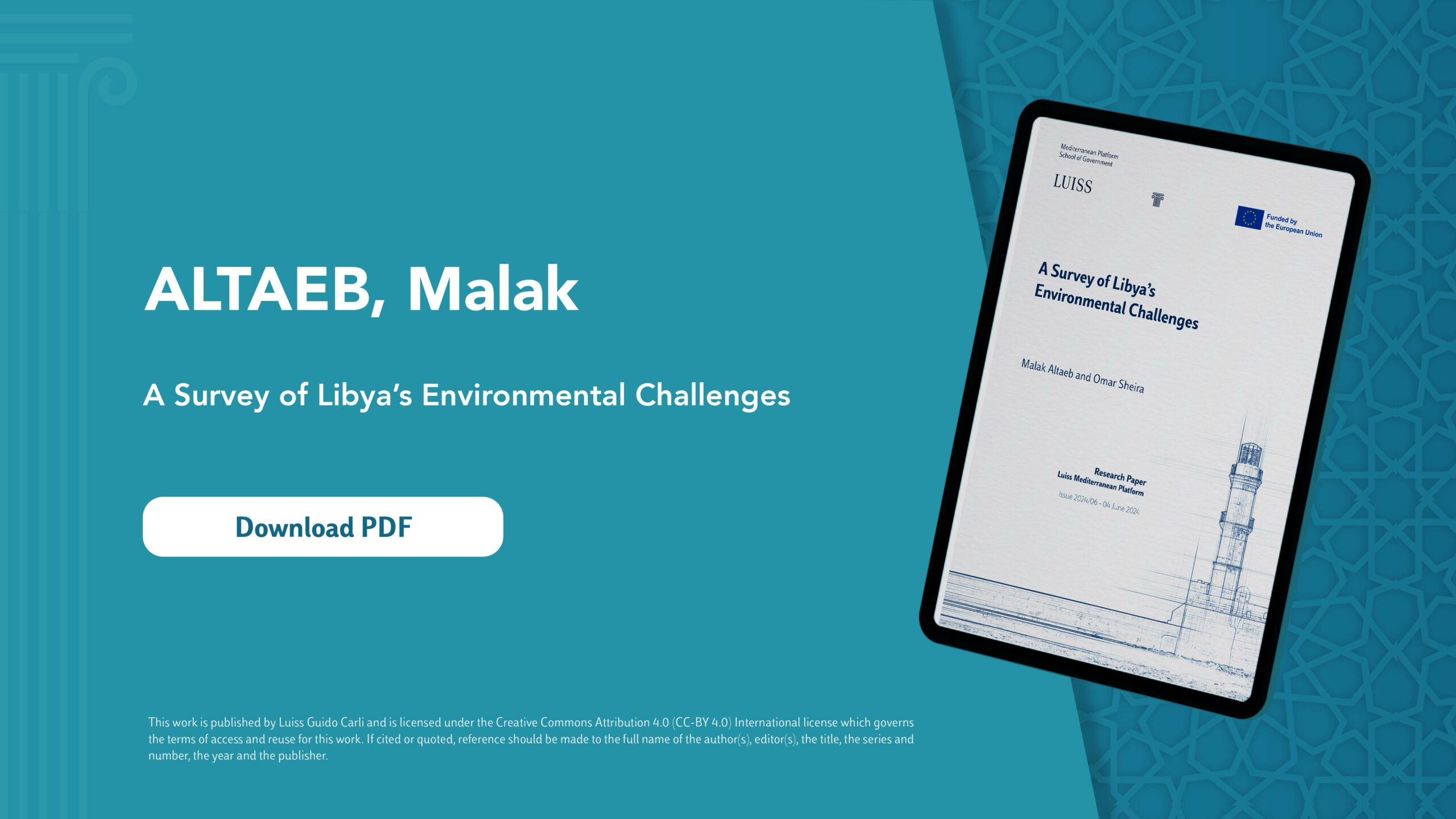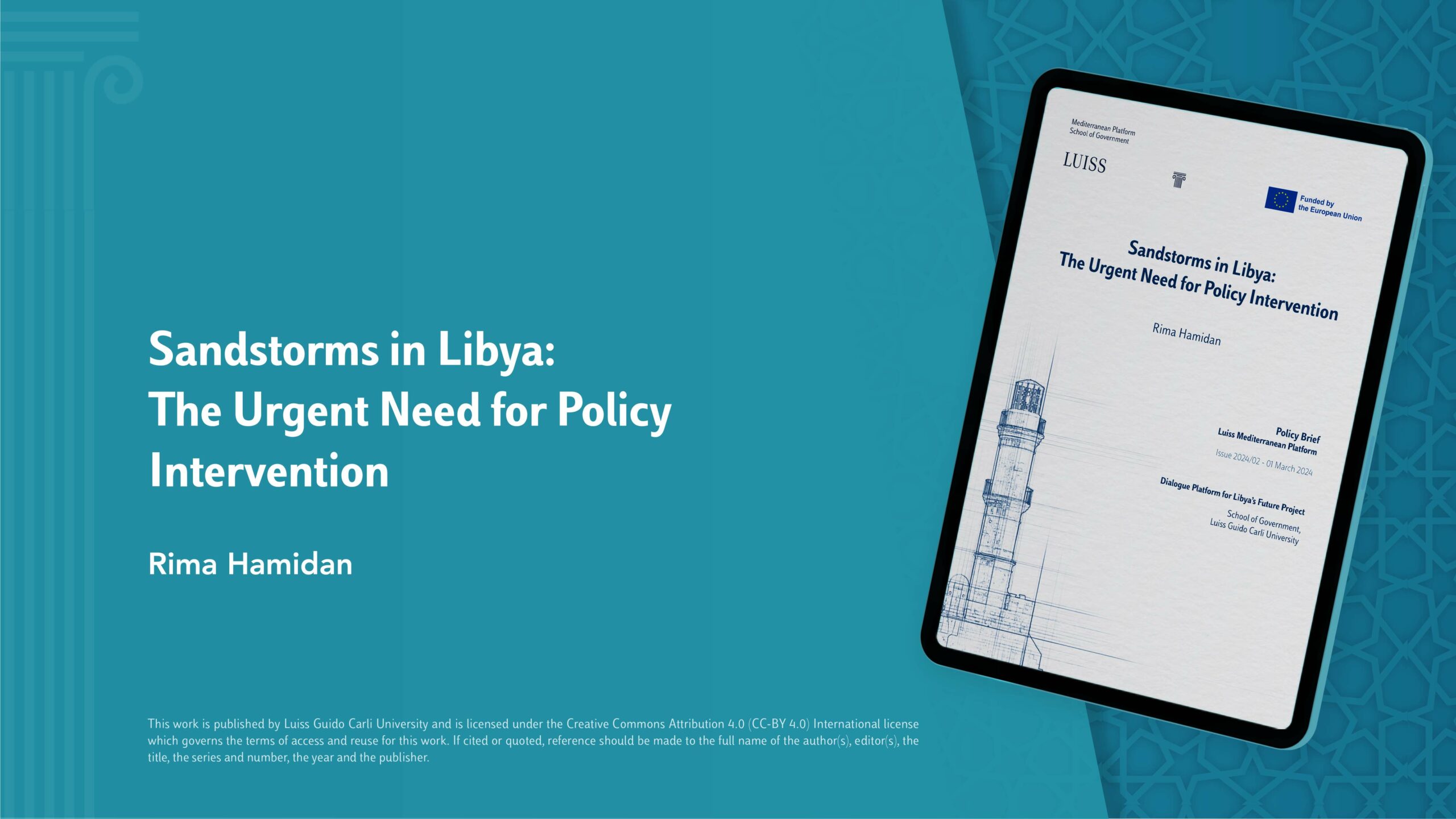Local Governance in Libya
Local governance has emerged as a central issue in Libya’s conflict resolution and political stabilization efforts over the past decade. It plays a critical role in addressing local grievances, promoting equitable resource distribution, and rebuilding trust between citizens and state institutions.
Local governance is also a key pillar of the Peace Makers-led Multitrack Roadmap Initiative for Relaunching the Political Process—an inclusive effort bringing together Libya’s political and civil actors to foster a Libyan-owned, participatory process aimed at stabilizing the country through meaningful governance reforms.
As part of the EU-IcSP-funded project “Libya’s Permanent Political Platform”, the Luiss Mediterranean Platform has published two policy papers examining the future of local governance in Libya and how a reimagined system could contribute to long-term peace and institutional resilience.
• The first paper clarifies key concepts, maps stakeholder positions, and stimulates informed national dialogue on the meaning and implications of local governance.
• The second paper focuses on administrative levels and boundaries, offering a practical, context-sensitive framework for subnational governance reform.
• A forthcoming third paper will address issues of power-sharing and resource distribution.
Together, this policy series is designed to inform and support national dialogue, assess viable policy options, and contribute to the design of governance systems that reflect Libyan aspirations.
The production of these papers is closely linked to the pace of political dialogue led by Peace Makers Libya, and reflects the need to build consensus among a broad spectrum of stakeholders before moving toward formal policy proposals. A complementary set of documents—developed through this inclusive, participatory process—will soon be made available to support and align with ongoing UN-led mediation efforts, including those related to Libya’s constitutional track.
Levels of Government and Administrative Boundaries in Libya’s Future Local Governance System
Author: Intissar Kherigi
Publication date: July 2025
Access links:
https://bit.ly/3U8e4J7 for English
https://bit.ly/4lCd0cZ for Arabic
This paper explores how Libya can reconfigure its subnational governance and administrative boundaries to build a more inclusive, functional, and legitimate local governance system. Drawing on extensive consultations with Libyan stakeholders—including over 30 semi-structured interviews, two expert workshops, and comparative analysis of international boundary reform experiences—it presents a structured framework for redesigning administrative divisions that reflects the country’s legal, historical, and social complexities.
The paper argues that effective local governance requires boundaries aligned with population needs, resource distribution, and equitable service delivery. Rather than relying on top-down reforms, it advocates for a participatory approach that engages communities, traditional authorities, local councils, and political actors to build consensus and ensure local legitimacy.
To support this process, it proposes a three-tier governance model comprising municipalities at the local level, intermediary administrative units (such as districts or provinces), and a national authority responsible for coordination, oversight, and standard-setting. This approach is informed by international experiences—particularly in South Africa and Nigeria—which show how inclusive boundary reforms can enhance institutional resilience and public trust.
[…]
Prospects of Local Governance in Libya: Framing the Debate for Post-Conflict Stability
Authors: Intissar Kherigi and Ridha Ellouh
Publication date: 2024
Access links:
https://bit.ly/4fSqsG4 for English
https://bit.ly/3OaGQ9l for Arabic
This inaugural paper in our dedicated series aims to clarify key concepts, map stakeholder positions, and stimulate informed dialogue on local governance in Libya. It draws on interviews with Libyan experts, academics, and representatives of political and social groups, as well as insights from an in-person workshop held in Rome in February 2024 (FPI/2022/433-693). A comprehensive desk review of relevant literature and historical sources also informs the analysis.
The paper explores the contested and politically sensitive terms “decentralization” and “local governance.” While some actors see decentralization as an essential shift of power to subnational authorities, others view it as illegitimate or externally driven. This lack of consensus—both in terminology and substance—has contributed to a continued stalemate in efforts to reform local governance.
Structured in three parts, the paper:
- defines and contextualizes key concepts
- traces the historical evolution of local governance in Libya
- examines Libyan actors’ preferences for future governance models
[…]
Conflicting Visions and Overlapping Concepts in Libya’s Local Governance System
Author: Marwa Al-Shaybani
Publication date: May 2024
Access links:
https://luiss.short.gy/V7aiXw for English
https://luiss.short.gy/CUAnvo for Arabic
This paper examines the evolving landscape of local governance in Libya, focusing on recent efforts to reform electoral processes and administrative structures as part of a broader decentralisation agenda. Triggered by the 2024 shift in municipal elections—now conducted independently by the High National Election Commission—these developments signal a move away from centralised control and toward greater local autonomy. At the same time, the Presidential Council’s proposal to assess a governorate system reflects growing momentum to rethink the foundational architecture of local administration in Libya.
The paper argues that despite over a decade of legal reforms—most notably Law No. 59 of 2012—Libya continues to face entrenched challenges of over-centralisation, fragmented authority, and weak service delivery. These issues are compounded by a persistent lack of consensus among decision-makers on the optimal governance model, as well as by ambiguity in defining key concepts such as decentralisation and local authority.
Through a historical review of Libya’s governance structures under the monarchy, the Jamahiriya regime, and the post-2011 transition, the paper highlights recurring patterns of institutional experimentation and conceptual confusion. It contends that future reforms must go beyond structural adjustments and instead build clarity around roles, responsibilities, and the meaning of local governance itself.
Rather than imposing one-size-fits-all models, the paper advocates for a context-specific, dialogue-driven process that includes national and local stakeholders. Only through inclusive engagement and conceptual alignment can Libya move toward a local governance system that is legitimate, responsive, and capable of meeting citizens’ needs.
[…]
Zooming In
Environment
A Survey of Libya’s Environmental Challenges, Malak Altaeb and Omar Sheira, June 2024.
Vital infrastructure
“Sandstorms in Libya: The Urgent Need for Policy Intervention”, Rima Hamidan, March 2024.
Roads
“Wadi al-Shatii: Struggles Along the Road”, Waleed Khaleefah, January 2024.
Reconstruction
“Delays in Rebuilding Benghazi: The Case of the al-Sabry Neighbourhood”, Libya Initiative Team, March 2022.
Water and sanitation
“Addressing Sebha’s Water and Sanitation Crisis”, Waleed Khaleefah, February 2022.
Education
“Do More Universities Mean Better Education for Young Libyans?”, Libya Initiative Team, January 2022.
Waste management
“Waste Management in Tripoli: A Temporary Crisis or a Long-Lasting Imbroglio?”, Rima Hamidan, June 2021.
Healthcare
“The Covid-19 Pandemic Highlights the Inadequacy of Sebha’s Healthcare Services”, Rema el-Fellani, May 2021.
In focus
The Red Sea: Divided by Water, United by Opportunities
GHANEM, Dalia, NARBONE, Luigi, PALLESCHI, Carlo and TADDELE MARU, Mehari (ed.)
25 February 2026
Distribution of Powers in Libya’s Future Local Governance System
KHERIGI, Intissar
5 February 2026
Subnational Governance in Divided Societies: Learning from Yemen to Inform Libya’s Peace Process
MRAD, Mohamed Aziz
8 January 2026









